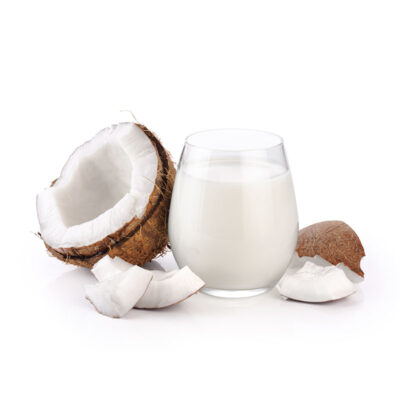Is Coconut Milk Good for Diabetes? Here Are the Facts
Coconut milk is a food rich in saturated fats and dietary fiber. However, is it good for people with diabetes? Check out coconut milk’s nutritional value and health benefits for people with diabetes.

Coconut milk is a type of milk obtained from the meat of a ripe coconut. It has been steadily growing in popularity in the last couple of years, which is not surprising given that many people have become health-conscious.
As new dairy alternatives, such as coconut milk, continue to emerge, you might wonder: Is coconut milk good for diabetes?
Coconut milk’s healthy fat content is shown to help people with diabetes by regulating their blood sugars. Coconut milk gets its popularity from its wealth of nutrients that benefit your health. The benefits come from its fat content, which contains medium chain triglycerides. These MCTs have anti-inflammatory properties that carry many benefits for the body.
Since coconut milk is an excellent source of dietary fiber while also containing small amounts of protein and fat, let’s find out more about its benefits and effects on blood sugar for people with diabetes.
Is Coconut Milk Good for People With Diabetes?
Coconut milk is a dairy-free and vegan alternative to regular milk. Coconut is a super food that even patients with diabetes can indulge in. However, people with diabetes need to consume coconut milk in moderation.
Peer-reviewed studies reveal that the milk pressed out of coconuts possesses many nutrients that will benefit a person with diabetes, but the consumption needs to be regulated because of its glycemic index.
Consuming coconut milk in limited quantities helps people with diabetes benefit from the nutrients without causing an insulin spike.
This milk extract is also rich in fiber, which helps maintain a blood glucose balance by slowing down the conversion and absorption of starch into glucose. It also enhances metabolism, aids in weight loss, raises good cholesterol levels, and supports the body’s general functioning.
The strict cut-offs for a diabetic diet dictate that all nutrients are consumed in regulated amounts. The fat content in coconut milk can exceed the required limits leading to increased cholesterol and other risks for a person with diabetes.
It is best to stick to a maximum of 2 cups of coconut milk product daily.
Coconut Milk’s Nutritional Value
A 100g serving of raw coconut milk contains:

Coconut milk also contains other nutrients in small quantities, including calcium, potassium, sodium, iron, vitamin C, and more.
These nutritional facts make coconut milk good for people with diabetes. Compared to coconut water which doesn’t contain coconut flesh, the fat content of coconut milk is slightly higher. Find out the full nutritional profile of raw coconut milk here.
Glycemic Index of Coconut Milk
The glycemic concept of food helps determine how it affects your blood sugar levels. This is a crucial metric for people with diabetes. Coconut has a glycemic index of 42. However, naturally occurring coconut milk has a high glycemic index of 97, whereas regular cow milk has a lower glycemic index of 47.
In contrast, coconut milk has a low glycemic load of 4.81. The glycemic load is a measure that ranks how the food and the portion consumed affect the blood sugar levels.
On the other hand, the glycemic index and glycemic load of canned or packaged coconut milk are higher than that of fresh coconut milk because it contains added sugar and fat. You must choose your milk wisely if you want to manage your weight.
This is why people with diabetes need to watch their coconut milk portions so that their bodies receive sufficient energy while maintaining stable blood sugar. To make coconut milk products even safer for people with diabetes, you can mix coconut milk with other highly nutritious foods.
5 Benefits of Coconut Milk for Diabetes
Adding coconut milk to a diabetes patient’s diet has many benefits. It is said to contain healthy fats that provide lasting energy and make you feel full for longer. This gives people control over their weight since coconut sugar is not as high as in other drinks. Other benefits of coconut milk include:
#1 Lowers blood pressure
Coconut milk lowers blood pressure and cholesterol. Studies show that coconut cream is an excellent source of potassium, which helps regulate blood pressure, fatigue, and salt sensitivity. Consuming coconut milk helps people build muscles and reduce fat in their bodies.
#2 Boosts immune system
Coconut milk is a healthy source of nutrients and minerals, including lauric acid. Lauric acid has antiseptic properties that help the body fight infections. Drinking coconut milk provides the body with nutrients that help the body against diseases and improve overall immunity.
#3 Improves insulin secretion
The presence of medium chain triglycerides in coconut milk aids insulin secretion, which is crucial for people with diabetes. Increased insulin sensitivity helps manage blood glucose levels and improves body functioning.
#4 Good for your heart
Among the health benefits of consuming coconut milk is heart health. The milk helps lower bad cholesterol levels in the body. Healthy cholesterol levels are crucial for heart health, and when you drink coconut milk or cream, it provides a healthy source of saturated fat.
#5 It might help to lose weight
Weight gain is a constant worry for people with diabetes; excess fat leads to harmful cholesterol levels. Coconut milk increases energy and decreases appetite, thus helping people manage their weight. The presence of MCTs has been shown to reduce the symptoms of diabetes as it promotes healthy weight loss.
FAQs
Coconut milk is a healthy drink that can be consumed for diabetes as an alternative to dairy, provided it is consumed in the right way and in a healthy range. It can be used on its own or as an ingredient in a healthy smoothie, breakfast cereals, boiled oats, porridge, rich sauces, and soups.
The best time to consume coconut milk for people with diabetes is in the morning, an hour before breakfast, on an empty stomach. However, you can consume it any time of day, provided you take it on an empty stomach. Drinking the milk early in the morning helps kickstart your metabolism, as the fat in the milk is easy to digest.
Coconut milk is better for diabetes patients than regular milk. Regular milk contains lactose, a sugar that is hard to digest, especially for those who have diabetes. Therefore, coconut milk is an excellent choice for a diabetic diet. However, regular milk has more vitamins compared to coconut milk.
People with diabetes can drink coconut milk daily but in moderate quantities. Coconut milk is high in fat; therefore, people with diabetes should consume it in limited amounts, especially varieties with added sugars and fat. Drinking too much coconut milk is a risk factor that leads to increased blood sugar and weight, which can cause further health complications.
A Word From Our Nutritionist
Coconut milk has been debated as a healthy dairy alternative for people with diabetes. The milk contains electrolytes, nutrients, minerals, proteins, fats, and dietary fiber, making it a healthy drink for people with diabetes.
Coconut milk has a high glycemic index due to its high-fat content, which can cause high cholesterol and weight gain if taken in excess. However, the lower glycemic load makes it safe for people with diabetes. A more fluid form of coconut milk has the same calories as semi-skimmed milk, while a thicker form has more calories.
The presence of MCTs accelerates metabolism, and the fiber content slows the conversion of glucose, ensuring the blood sugar levels rise at a very slow pace. It is recommended that people with diabetes consume coconut milk in moderation because excess consumption can lead to many health risks.
Coconut milk is good only when consumed within acceptable limits for optimal benefits. People with diabetes should strive to consume raw coconut milk instead of processed varieties containing added sugars and fats.
It is, however, best to consult a licensed healthcare practitioner before making any drastic dietary changes.
Conclusion
Coconut is a healthy fruit, and as more ways of consuming it become clear, its health benefits are also being revealed. Coconut milk is now used in various cuisines and is deemed healthy for people with diabetes.
Most forms of milk have glucose levels that are detrimental to a diabetes patient. Still, its high fat can affect cholesterol levels.
People with diabetes have many food restrictions extending to their coconut milk consumption. While it is safe to drink coconut milk, we must moderate consumption to avoid weight gain and high blood glucose levels.

















































 Select your language:
Select your language: 








